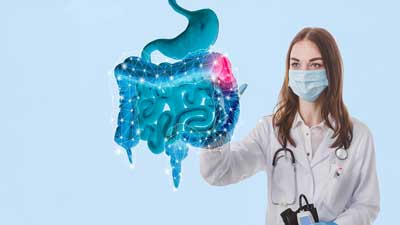
Gastric or Stomach Cancer is a severe condition that can cause fatalities, especially when it is not detected on time. It occurs when Cancerous cells begin to grow on the stomach lining.
The stomach is a major digestive organ. Its primary function is to digest food and send it to the small intestine. It also temporarily stores food and produces enzymes & other specialised cells to digest it.
Table of Content:-
“Once Cancerous cells in the stomach grow out of control, they form a tumour. In most cases, this happens over a considerable period. As a result, in most cases, stomach Cancer often remains undiagnosed until it spreads to other organs in the body,” said Dr Rakesh Patel, Consultant Gastroenterology, Fortis Hospital Kalyan.
Is Gastric Cancer common in India?
Although the incidences of Lung, Oral, Cervical, and Breast Cancer are much higher than Gastric Cancer, low levels of awareness and lack of screening processes are impacting its detection and cure. As per Indian Journal of Medical and Paediatric Oncology, in India, Gastric Cancer is the fifth most common Cancer, constituting 7.2 percent of all cases, with a higher incidence in northeastern states, which are comparable to high-incidence areas globally.
What are the risk factors for Stomach Cancer?
Multiple factors can increase a person's risk of developing Gastric Cancer. While some factors are modifiable and can be controlled with proper lifestyle changes, other factors are beyond a person’s control.
Some modifiable risk factors that can help increase the risk of stomach Cancer include lifestyle factors like smoking, high alcohol usage, poor physical activity, high consumption of smoked, salted, or poorly preserved food, low consumption of fruits & veggies, and uncontrollable weight gain and obesity.

On the other hand, non-modifiable risk factors include diseases caused by Helicobacter Pylori (H-Pylori) bacteria (which is a significant cause of rising cases of Gastric Cancer in China) and the Epstein-Barr virus. The risk of Gastric Cancer also increases if a person already has a history of infections like Polyposis Syndrome (a hereditary condition that increases the risk of developing polyps in the digestive tract), GERD, or Acid Reflux (a digestive disorder where stomach acid or bile irritates the food pipe lining) and Pernicious Anaemia and Atrophic Gastritis.
Also read: Stomach Cancer Awareness Month: Expert Shares How Smoking Causes Stomach Cancer
Also, people above 60 or those having a family history of Cancer are at a greater risk of Gastric Cancer. It is essential to understand that having any one of the risks mentioned above is not a diagnosis of Cancer, but that if a person has these risk factors, they are more likely to develop Cancer than someone without that risk factor.
How can Stomach Cancer be prevented?
Although preventing gastric Cancers is not always possible, specific steps can help reduce the disease risk. According to Dr Pal, these include the following:
- Maintaining a moderate body weight as Obesity is a significant risk factor
- Eating a well-balanced meal that is rich in fruits and vegetables
- Consumption of small amounts of spices can help prevent Gastric Cancer
- Ensure that high amounts of packaged or salted food are not consumed
- Always preserve food in a proper manner
- Limit alcohol intake and avoid smoking
- Regular exercise
If a person has been diagnosed with GERD or Gastroesophageal Reflux Disease, they must be treated by a specialist. Since GERD can cause another condition called Barrett's Oesophagus, the patient must be monitored throughout treatment.

“Barrett's Oesophagus can cause damage to the lower portion of the tube that connects the mouth and stomach (oesophagus), which, if left untreated, can increase the risk of Gastric Cancer” said Dr Patel, adding, as mentioned above, since Helicobacter Pylori bacteria is a significant risk factor for Gastric Cancer, patients who have been infected with this bacteria will need to be monitored by specialists to ensure that they do not contract Stomach Cancer. People who have a family history of Gastric Cancer should consider getting an early screening test. To check for signs of the disease, a specialist may conduct screening tests, including physical examinations, laboratory tests for urine and blood, and imaging procedures, such as X-rays, Endoscopy, and genetic tests.
Also read: Stomach Cancer Awareness Month: Expert Suggests Foods That May Increase The Risk Of Stomach Cancer
It is recommended that high-risk patients undergo regular surveillance Endoscopy so that if signs of Gastric Cancer are found, they can be treated promptly and, therefore, prevent morbidity and mortality.
More importantly, with technological advances in diagnosis with image-enhanced Endoscopy and endoscopic treatment, complications can now be reduced and patients’ quality of life diagnosed at the appropriate time enhanced.
Also watch this video
How we keep this article up to date:
We work with experts and keep a close eye on the latest in health and wellness. Whenever there is a new research or helpful information, we update our articles with accurate and useful advice.
Current Version